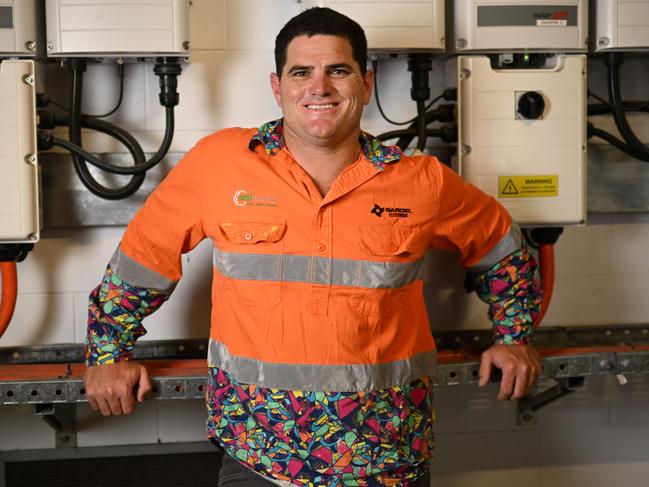Data reveals jobs most and least likely to cause psychological injury in Australia
Workers comp payments for a type of on-the-job injury have hit a record high, and experts expect this to at least double by 2030. See how your job ranks.
National
Don't miss out on the headlines from National. Followed categories will be added to My News.
Tradies, ambos, freight handlers and shelf fillers are up to 25 times more likely to be mentally traumatised by their job than other Australian workers.
A record 14,244 workers compensation claims were accepted for psychological injuries in the 2020-21 financial year, according to data from Safe Work Australia.
That’s a 64 per cent increase from five years earlier.
Construction trades workers – including carpenters, bricklayers, plumbers, painters, floor finishers, glaziers, plasterers and tilers – had the highest risk of developing or worsening a mental health condition due to their work, with 1636 successful claims lodged in 2020-21, or roughly one accepted claim for every 227 people employed in those occupations.
Psychological injury was also common among health and welfare support workers, such as ambulance officers, paramedics, enrolled nurses, dental hygienists and Indigenous health workers (652 claims, or about one per 230 workers), and labourers outside of construction or mining, such as freight handlers and shelf fillers (1005 claims, or one per 234 workers).
Committee for Economic Development Australia (CEDA) senior economist Cassandra Winzar said it was not surprising construction trades were at the top of the list, but employers in this industry were “taking good action”.
“They often work long hours in difficult conditions and don’t have that level of control over what they do day to day and they are under a lot of pressure,” she said.
“It’s different to people who have a desk job and might work from home.
“They have to be on site and often for long periods, and working weekends.
“There have been some cultural issues where people in trades and construction may not have been willing to speak up about mental health issues.
“They have taken the most steps to make some changes.”

At the other end of the spectrum, the Safe Work Australia data showed hospitality workers were the least likely to lodge a successful claim for work-related mental health conditions in 2020-21, with just 56 claims or the equivalent of one per 5573 people.
Other happy workers included cleaners and laundry workers (55 claims, or about one for every 5136 workers), information and communication technology professionals (69 claims, or one per 5013 workers) and farmers and farm managers (38, or one per 4331 workers).
CEDA’s Mental Health and the Workplace report predicted the number of mental health-related claims in Australia could double or triple by 2030.
This is significant for both workers and the economy as the Productivity Commission’s Inquiry into Mental Health estimated mental illness was already costing as much as $40 billion a year from loss of productivity and participation in the workplace.
Allianz Workers’ Compensation claims data showed psychological claims were responsible for 26,600 employee leave days in the 2021-22 financial year – a 19 per cent increase on the 2018-19 financial year, before the pandemic.

Allianz Australia chief general manager personal injury Julie Mitchell said the two primary causes of psychological injury were work-related harassment – such as bullying – and work-related pressures, such as those caused by unrealistic expectations or poor job design.
“These two areas can be prevented by having good culture in the workplace and having good strong leadership across the organisation and really understanding what the risk factors are for your employees,” she said.
Ms Mitchell said an increase in remote work since the Covid-19 pandemic had been “great for some” but for others it had led to difficulty disconnecting and setting boundaries, which negatively impacted mental health.
“We saw a 17 per cent increase in primary psychological claims since pre-pandemic times … and that trend is expected to continue,” she said.
Ms Winzar said there were great benefits for businesses that invested in employee’s mental health, including improved productivity and reduced sick leave, which led to better business outcomes.
She said having more Generation Z Australians entering the workplace may have a positive impact on claims, as the cohort – currently 25 and younger – is more aware of their mental health and that might kick start the required cultural change.

Gardel Electrical managing director Sam Gardel makes sure his 35 employees know they can talk about their feelings or take a day off if they are burning out – no need to fake a sickie.
Staff at the electrical and solar company – which services from Townsville to northern NSW – wear TradeMutt shirts with attention-grabbing colours and prints that are designed to start a conversation about mental health.
He also works with a performance coach to boost his emotional intelligence and be more approachable for his workers.
“(The coach) is also available to the guys and quite a few have reached out for a chat,” he said.
“One of the 20-year-olds broke up with his girlfriend and he was in the dumps so they had a chat and got him back on track and he is feeling better about himself.
“I think I have got the highest retention rate (for staff) in the industry out of any company I know.”
Originally published as Data reveals jobs most and least likely to cause psychological injury in Australia




